|
|
|
Sort Order |
|
|
|
Items / Page
|
|
|
|
|
|
|
| Srl | Item |
| 1 |
ID:
087393
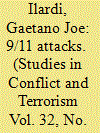

|
|
|
|
|
| Publication |
2009.
|
| Summary/Abstract |
The 9/11 attacks on New York and Washington, D.C. were undoubtedly the most brazen and shocking terrorist attacks conducted by a sub-state group in history. Al Qaeda's capacity to achieve this outcome depended in large part on its meticulous intelligence and counterintelligence preparations. These activities allowed Al Qaeda to exert a strong measure of control over its operating environment, leading to a confidence that events would unfold as planned. Moreover, intelligence and counterintelligence allowed Al Qaeda to form highly accurate and realistic assessments of its environment, an outcome that helps to dispel notions of an organization consumed by a level of fanaticism that distorts its perception of reality, or else frustrates its capacity to engage in rational decision making
|
|
|
|
|
|
|
|
|
|
|
|
|
|
|
|
| 2 |
ID:
137831
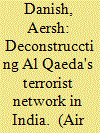

|
|
|
|
|
| Summary/Abstract |
Al Qaeda is characterised by a broad based ideology, a novel structure, a robust capacity for regeneration and a very diverse membership that cuts across ethnic, class and national boundaries. It is neither a single group nor a coalition of groups: it comprises a core base or bases in Afghanistan, satellite terrorist cells worldwide, a conglomerate of Islamist political parties, and other largely independent terrorist groups that it draws on for offensive actions and other responsibilities.
|
|
|
|
|
|
|
|
|
|
|
|
|
|
|
|
| 3 |
ID:
182242
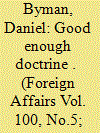

|
|
|
|
|
| Summary/Abstract |
In the20yearssince the 9/11 attack,
U.S. counterterrorism policy has
achieved some striking successes
and suered some horri¼c failures.On
the positive side, jihadi organizations
such as al Qaeda and the Islamic State
(also known as ISIS) are now shadows of
their former selves, and the United
States has avoided another catastrophic,
9/11-scale attack.Theworst fears, or
eventhe more modest ones, of U.S.
counterterrorism ocials have not been
realized. With terrorism less of an
immediate concern, U.S. President Joe
Biden has turned Washington’s focus
toward China, climate change, and
other issues—even withdrawing U.S.
troops from Afghanistan as part of an
eort to end the so-called forever wars.
|
|
|
|
|
|
|
|
|
|
|
|
|
|
|
|
| 4 |
ID:
103431
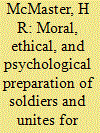

|
|
|
| 5 |
ID:
130471
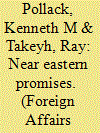

|
|
|
|
|
| Publication |
2014.
|
| Summary/Abstract |
Contrary to popular myths and conspiracy theories about Washington's desire to control the Middle East, for the past six decades, U.S. policymakers have usually sought to minimize the United States' involvement there. But the high-stakes nature of American interests in the region -- particularly oil -- and the complexity of the Middle East's problems always seem to draw the United States back in. In spite of himself, U.S. President Dwight Eisenhower was sucked into the Suez crisis in 1956 and the pan-Arabist revolts of the late 1950s. Lyndon Johnson barely lifted a finger to prevent the Six-Day War in 1967. Richard Nixon found himself grudgingly drawn into the region by the 1973 Arab-Israeli war and the superpower nuclear crisis it caused. Despite his aggressive image, Ronald Reagan did little in response to repeated attacks in Lebanon and the Persian Gulf by Iran and its proxies. George H. W. Bush came to office hoping to ignore Saddam Hussein, not to go to war with him. And although it is rarely remembered today, George W. Bush was not particularly interested in the Middle East and paid little attention to the region prior to the 9/11 attacks.
|
|
|
|
|
|
|
|
|
|
|
|
|
|
|
|
| 6 |
ID:
133524
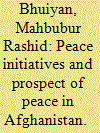

|
|
|
|
|
| Publication |
2014.
|
| Summary/Abstract |
After the 9/11 attacks, the US-led coalition launched the global War on Terror, invaded Afghanistan and ousted the Taliban from power. The Karzai government came into power in January 2002. Nevertheless, the war is going on even after twelve years. Peace remains unachievable in Afghanistan while the war has spilled over into neighbouring Pakistan, given rise to several militant groups, continues to create instability in bordering countries. To end this bloody war, various parties have undertaken peace initiatives with the Taliban but the initiatives are facing growing uncertainty for various reasons e.g. the nature of the proposed withdrawal of NATO forces by 2014 is not clear, parties lack consensus, prioritise their individual interests and viewpoints, attach various conditions and change positions before and during peace talks etc. Pakistan, despite being a crucial actor in the current war in Afghanistan, has been experiencing its own security problems and much troubled relations with both Afghanistan and the NATO since joining the war. These have been negatively impacting peace initiatives. The country also remains deeply suspicious about another regional power India's growing involvement in and relations with Afghanistan. Besides the Afghan Taliban and Pakistani Taliban (TTP), there are several other militant groups active in Afghanistan and Pakistan, such as the Haqqani Network or the Hizb-e-Islami of Gulbuddin Hekmatyar (HIG) who pose significant threats. But they are seldom invited in peace talks and similarly, their positions or perspectives on peace process are hardly ever addressed or taken into consideration. Meanwhile, the Karzai government's relations with the US-led coalition are also not working well; this is visible from the increasing disagreements and mistrust plaguing their mutual ties. Owing to these reasons, a long-lasting peace seems unattainable for Afghanistan in near future.
|
|
|
|
|
|
|
|
|
|
|
|
|
|
|
|
| 7 |
ID:
099240
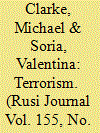

|
|
|
|
|
| Publication |
2010.
|
| Summary/Abstract |
Five years since the 7/7 London bomb attacks and almost a decade after the 9/11 attacks in the United States, the jihadist terror threat from violent extremists has evolved in significant ways, particularly as it affects the United Kingdom. Research indicates that one wave of terrorism directed at the UK has more or less run its course. But there is powerful circumstantial evidence to indicate that another phase may soon emerge and that it may be quite different from before.
|
|
|
|
|
|
|
|
|
|
|
|
|
|
|
|
|
|
|
|
|